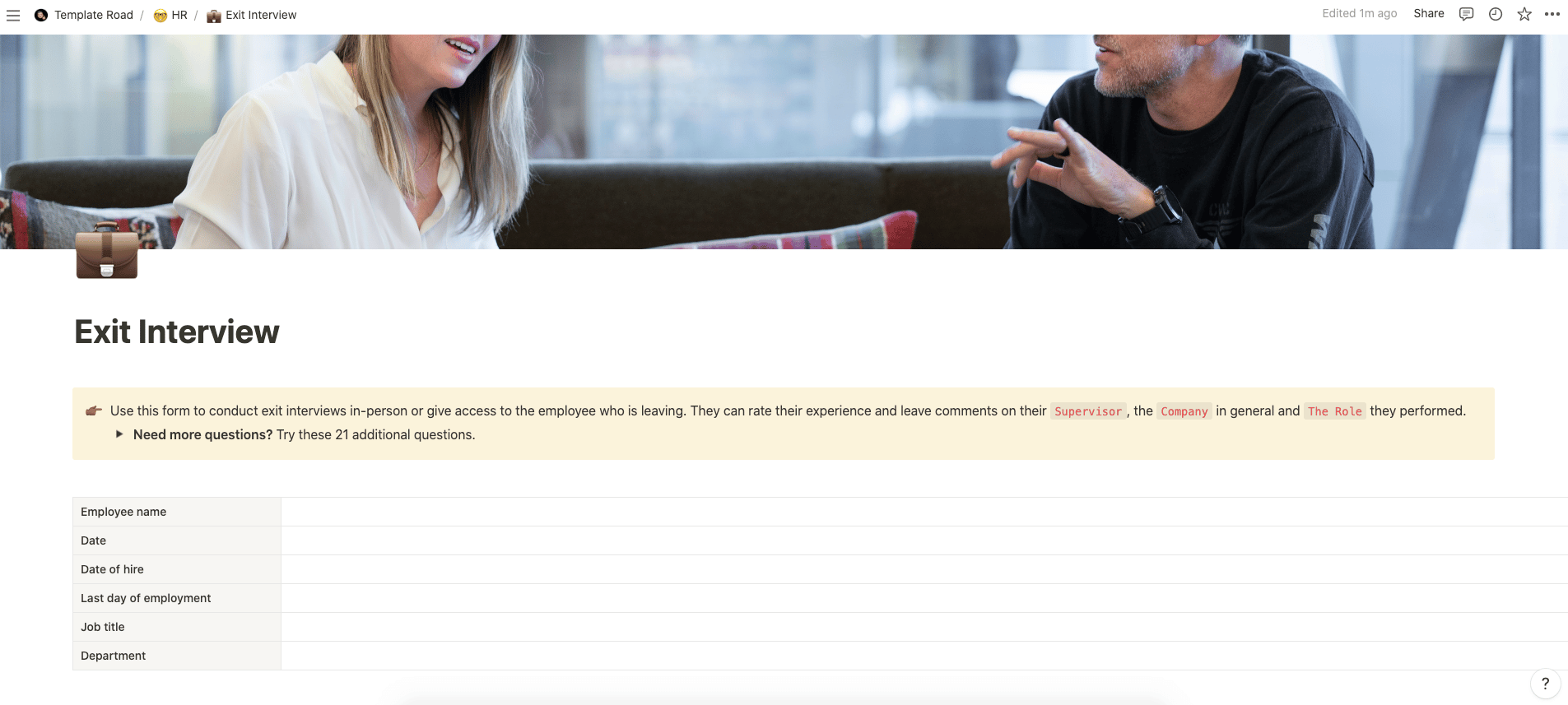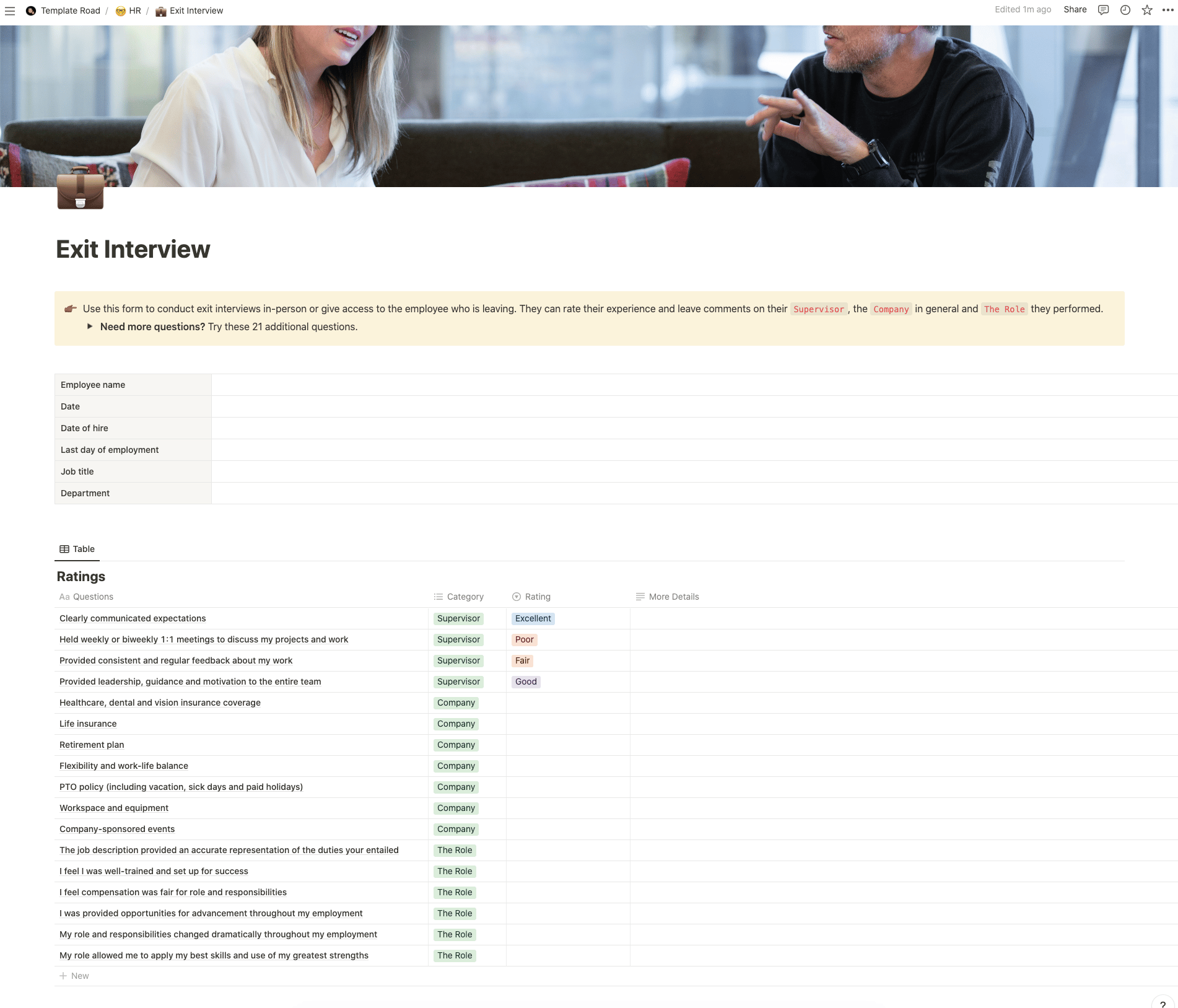This template is perfect for ensuring you gain valuable insights from exiting employees.
Buy on
Contents
Notion – Exit Interview Template
This template is perfect for ensuring you gain valuable insights from exiting employees. In order to retain an employee, one must ensure they are happy. Employees who feel valued and appreciated are much happier and more productive than those who do not. However, if an employee feels undervalued or disrespected, they will eventually seek employment elsewhere. Therefore, it is important to make sure that staff retention strategies are implemented correctly. A good strategy would involve ensuring that every member of staff is treated fairly and equally.
——————————————-
What you need before purchase
- Basic knowledge of how to use Notion
- Paid Notion account if you want to add lots of content to your template / Notion account (sign up here). Not much content? You’re able to use their free account.
After purchase, you’ll be able to view the template immediately. The template can be added to your Notion account by:
- Click on the template download link in Gumroad
- When viewing the Notion template, click on the “Duplicate” link in the top-right of your screen
- The template will now be available in your own Notion account
For ongoing use, the steps are:
- Login to Notion and select the template you want to view
- Click on the Duplicate link in the top-right of your screen to create a copy to use
- You’ll be able to retain the Notion template and work on the Duplicate (with a new name) and can repeat this process whenever you want to use the template again
What is an exit interview?
An exit interview is a meeting between the employee and their manager or supervisor after they have left the company. It’s a chance for you to ask questions about why they are leaving, what they liked most about working at your company, and any other questions that you may want to know. This can be done in person, over the phone, or via email.
Why is conducting exit interviews and surveys important?
Exit interviews help you understand why people leave your organization. They also provide insight into how well your employees feel about their jobs and the culture of your company. Exit interviews allow you to make changes where needed so that you can retain more of your current staff and attract new talent.
How to conduct an exit interview:
- Make sure you have all of the information you need before conducting the interview. You should know who the employee was reporting to, when he/she started with the company, how long he/she has been there, and if it was part-time or full time employment.
- If possible, schedule the interview during off hours so that you don’t interrupt anyone else’s work day.
- Be prepared to answer some tough questions. Some employees will leave on bad terms because they feel like they were not treated fairly by management. They might also leave because they didn’t get along with another co-worker.
- Don’t make them wait too long to give their answers. An exit interview shouldn’t take more than 30 minutes.
- Keep notes of everything that was said. You never know when you might need this information later down the road.
Do I need to conduct exit interviews?
We look a the main benefits of running exit interviews:
- Uncover issues relating to HR.
- Help identify potential problems within the organization.
- Give managers a chance to address these issues.
- Provide feedback to the employee.
- Identify strengths and weaknesses within the organization.
- Create a better understanding of the culture of the company.
Decide what to ask:
- Why did you decide to leave?
- What do you think we could improve upon here?
- How would you rate our performance as an employer?
- What did you enjoy most about working here?
- What did you dislike most about working here?
Decide what not to ask:
- Anything related to salary or compensation.
- Any personal matters such as family members, health concerns, etc.
- Anything that may jeopardize the relationship further between the two parties.
- Anything that is illegal or unethical.
- Anything that is considered confidential.
- Anything that is considered proprietary.
- Anything that is considered sensitive.


















